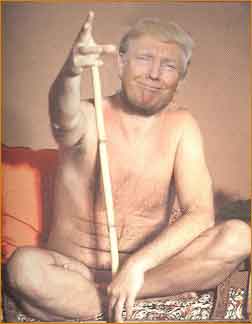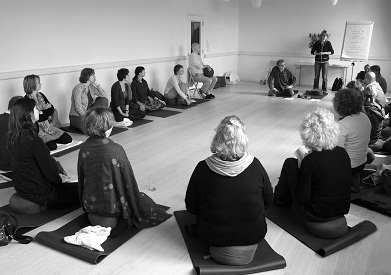By
Diana Dumbell
As part of a sponsorship deal, we can present an interview with Zen Master Think Not Hanh from the April 2016 issue of Lion’s Roar magazine.
 Only rarely has Zen Master Think Not Hanh accepted invitations to be interviewed, so I felt both honored and nervous when he graciously accepted my request. Master Think Not is arguably one of the most dynamic and inspiring spiritual teachers of our time. For the past decade he has been shortlisted for Watkin’s Most Spiritually Influential People, and attendance at his French farm/monastery has grown to a staggering 500 residents in 2015.
Only rarely has Zen Master Think Not Hanh accepted invitations to be interviewed, so I felt both honored and nervous when he graciously accepted my request. Master Think Not is arguably one of the most dynamic and inspiring spiritual teachers of our time. For the past decade he has been shortlisted for Watkin’s Most Spiritually Influential People, and attendance at his French farm/monastery has grown to a staggering 500 residents in 2015.
Think Not Hanh left his native Vietnam in 1990 to bring his then little-known brand of Zen to the West. After more than a decade in California, the unconventional monk was deported from the U.S. and re-settled in northern France, where he formed a small mindfulness community, called “The Homebrew Hermitage”, after the cabbage liqueur that local peasants have produced for centuries.
Within a couple of years, the new Sangha attracted more people than could be accommodated, and Master Think Not purchased a fertile piece of land near Reims, and built a new retreat center with room for several hundred resident students, called Pot Village. Every year, the community hosts a four-week harvest retreat, which has grown increasingly popular with Buddhists and weed aficionados alike.
Throughout my retreat at Pot Village, I was curious about the quaint little temple, which the monastics referred to as Atshitshiji. Finally, on the last day, I was invited inside and saw a cozy room brightened with fresh orchids, an image of the Buddha touching the earth, and a giant glass bong, mindfully tended by a monastic.
Thug, as he is affectionately called by the hundreds of devotees gathering around him, was seated at a rustic table, low to the ground, and I was ushered to a cushion beside him. During our interview, he revealed details about his lineage, explained the need for a suffering humanity to stop all thinking, and explained how—if you have mindful ears and mindful eyes—the Buddha is always teaching. Partway through our conversation, a reporter from High Times joined us, and the conversation turned to how enhanced meditation practice can benefit business leaders, organizations, and society.
As you read the interview, please keep in mind that there is one thing that didn’t make it onto the page, and that is Think Not Hanh’s frequent, endearing giggle and blissed-out smile.

Taking a deep draw from an ornate pipe that glows with burning marijuana, renowned Zen Master Think Not Hanh gives a satisfied grin through a haze of aromatic smoke in the dokusan room at the newly built Atshitshiji temple on the outskirts of Pot Village. These days, the charismatic Roshi has reason to feel good. Not only did he, finally, make the Watkin’s list. His agent just confirmed that Ken Wilber will provide a glowingly hyperbolic Preface to his new collection of Dharma talks. And then there is the global traction building to decriminalize pot, meaning that this neatly dressed lineage holder and doyen of the Transintegral Zen™ movement, who considers the effects of marijuana a perfect manifestation of Buddha-nature, may soon be able to smoke it without fear of arrest.
Not that he seems terribly concerned.
“We have treated marijuana as something legal all along, even though some of our monastics have been sent to prison for using the herb in our zazen practice. But this is the time for all these pressures to stop. The world is catching up now,” says the 75-year-old, remarkably vital Master.
“O-ganja,” as marijuana is called in his Sangha, has long been an integral part of Not Hanh’s spiritual path, and today you find traces of it everywhere at his many centers. Followers of Thug claim that skillful use of marijuana induces a meditative state that brings them closer to awakening. Residents at Atshitshiji monastery smoke it as part of their daily practice, add it to their vegetarian meals, and burn it as incense offerings. They even stuff their zafus with weed.
“A couple of years ago, we started an organic weed farm as part of our outreach program, offering the sans-papiers a meaningful job. Today we’re completely self-sufficient, and we actually produce more than we can use ourselves.”

Let’s start with what is perhaps the most unconventional aspect of your teaching: What is the role of marijuana in spiritual practice?
A friend can be a teacher, a fellow practitioner can be a teacher, and you yourself can be a teacher. A teacher is anyone who helps you practice and find more freedom—even freedom from your teacher.
O-ganja, as we call it, is such a teacher and that is why we trust it. You know, in the Sutras, the Buddha is often called “The Medicine King”. I have no doubt that O-ganja is the true medicine of the Buddhas and Patriarchs.
O-ganja is the sacrament that connects us with our lineage, going all the way back to the Buddha. When I, how you say … Spark it up? sometimes I invite my late teacher to join me, so as teacher and disciple we do it together. Inhaling deeply, half the circle. Holding it for as long as we can, the other half. When I get stoned, my teacher gets stoned. One, not two. You understand, yes?
I also invite all teachers of the past to do a circle with me, and I know that the joint I pass around is not my joint. Sometimes I invite all my friends to do it with me, because they are me also. So this house is full of friends, thousands of them, and we get stoned together. But there is only me here in this little house. You understand? I am alone but I am also everyone and we all get high together. This is the true Buddha-way as handed down to us by the Patriarchs.
Can you tell me a little about Zen in Vietnam? Does it have a particular flavor or character that distinguishes it from the Zen practiced in other countries?
At this question, Thug starts giggling, before erupting into a hearty, Zen style belly laugh, and it will be several minutes before the interview resumes.
Genuine Vietnamese Zen (not that bland, pious new-age stuff you read about in Tricycle), has a very distinct, very unique flavor. It’s actually known as … as … as … THE MARIUYANA!
At this point Thug laughs so hard that two of his attendants has to help him get back up on his zafu. Slowly he regains his composure and continues:
Our meditation practice in Vietnam is also very engaged in society. Farmers and monks always support each other. The farmers give weed to the sangha, and the monks and nuns get high for the benefit of the farmers. Wonderful system! Nothing like it in the West. This is true interdependence.
What is the contribution of genuine Vietnamese Zen to the West?
When I was still living in the monastery in Vietnam, I always watch American movies on VCR. Especially Cheech & Chong. Up in Smoke I see maybe fifty times. And I thought to myself: I must go to America some day. So when I leave the monastery, I go straight to California, teaching Westerners about Vietnamese Zen and the Mariuyana. I was first genuine Vietnamese teacher come there, you know.
Anyway … I look around and I see many California Buddhists. Very depressed people, very miserable. Very poor energy. Also many, many Buddhist teachers saying to them: Count your breath or What is Mu? or What is the taste of a raisin? But if you teach Buddhism like that, it will not work. Much too intellectual. That is why Buddhism has become marginal today. It’s too intellectual. But my Zen, Vietnamese Mariuyana, is not like that at all, and that’s why I have become very successful and losers like Genpo Merzel go out of business.
You see, authentic Buddhism is very simple: only do not think. That is all. No thinking, no dukkha. Nirvana is right here. Very simple, but also very, very difficult. Stopping thinking very, very hard for modern man.
That’s why practice with O-ganja is important for modern world. These teachings are easier for people to practice, even children can do it! And very powerful, very effective. But that does not mean these teachings do not have a strong Buddhist base. Their foundation is in no-self, impermanence, interbeing. And most important: no thinking. And getting high, which is the same thing, really. When you get really high, there is no distinction, and no thinking, and so no dukkha. Only nirvana. This is very important, very fundamental point.
Vietnamese Buddhism is very close to original Buddhism, actually, but we also make good use of the spirit of Mariuyana. There are a lot of wonderful things in Mariuyana Buddhism. For instance, in original Buddhism, you’re not supposed to get high. But in Mariuyana, we get high all the time.
So if you know how to get crunched, and become really, really stupid, the Buddha never stops teaching. The earth and your body will be beautiful expression of his teachings. The wind, flowers, and even the munchies continue to teach impermanence and no-self. You yourself is the body of the Buddha—the body of truth that never dies, as long as you stay mindful and high. So if you have mindful eyes and ears, you continue to see the Buddha when you’re blitzed. This corresponds to the notion that the kingdom of God is available in the here and the now. We could even help Christians change the notion of the kingdom of God. God can be the Dharmakaya, the true body of the Buddha. “Free as a bird and high as a kite”, as we say in Vietnam. Very simple, really. But also very, very difficult. You have to stay high all the time. This is a very, very deep practice. And a wonderful practice, too.

Some people say that in order to reach enlightenment, you should avoid all drugs.
That is incorrect teaching! Karma is action and thinking. When you produce a thought, that’s karma, either good or bad, mostly bad. Same thing with talking and doing things. That is not so good. Much better to stop thinking. Without thoughts, no speech and no action. That is Enlightenment beyond karma.
When you smoke pot, all thinking and doing and talking and stuff stops, and so suffering disappears. Poof! So your karma can only be good karma., yes? You have no discrimination, no anger, no negative thoughts and feelings, so your practice can only bring good results. The end of samsara means the end of negative things, especially thinking. And you feel really good. Why would we wish good things to stop? We want good things to continue. Our practice is to have the good things continue for a long time. That’s good karma and ultimately it will become great enlightenment.
If you read the Sutras this way, you see that the Buddha was always stoned. And he is still high, and he turns everyone on, he’s doing it because his disciples are his continuation. The patriarchs have passed the Dharma spliff to us. They didn’t bogart that joint, and we shouldn’t do it. So the Buddha is still producing karma—good karma! High karma!
As part of your North American tour, you’re going to meet with the CEOs of some leading companies. What do you think of business leaders and employees learning meditation?
We don’t have to worry whether meditation is being misused to make money. Meditation and getting high can only do good. It doesn’t just help you calm your own suffering. It also gives you more insight into yourself and the world. If your business is causing environmental problems and you feel bad about it, you should meditate and smoke pot and all those karmic thoughts will vanish, like clouds in the sky. When you experience the wisdom brought about by meditation and O-ganja, then naturally all unnecessary thinking stops. Then nirvana is right here, right now. Where are those thoughts that troubled you so much?
So don’t worry about whether meditation is serving a wrong cause. It can change a wrong cause to a good cause, and when you’re really stoned, there is no trace of dualistic thinking, anyway. And when every cause is a good cause, then you can really enjoy the weed.
How do you view competition in business, politics, and our personal lives?
We have to reconsider our idea of happiness. Even if you are successful in making more money, you still suffer. That’s why I always tell the sans-papiers working here that they should stop being so envious. You know, you can be very poor and live on the streets, begging for food. But if you cultivate the right attitude, you will become much, much happier than most businessmen.
To be mindful or high is the real success. For homeless people, it can be difficult to attend meditation retreats, and it can even be difficult to find a quiet spot to sit. But they can get high instead. When you are mindful or high, you don’t need to compete anymore. You compete because you are not high, or not mindful enough. The practice of smoking pot can help you suffer less and be happy. If you can’t afford it, you can grow your own. There is always a way to practice, if you’re committed.
In our society, it feels like everything’s speeding up and people are feeling overwhelmed. “How can I get a work permit? How is my family doing in the refugee camp? How do I get some food? Where shall I sleep tonight?” Thinking like that makes people very stressed and they lose their natural mindfulness. But if you stop speeding and running and worrying, you can find happiness right in the here and the now. There is no true happiness without peace. If you continue to run, if you are attached to your thinking, how can you have peace? We are running away from ourselves, our true self, and nature. That is our society today. We are afraid of going home and get high. And we do not allow O-ganja to heal us.
And we lose ourselves in our little devices. But companies sometimes use their intelligence and goodwill to create instruments that help us go home to ourselves and heal ourselves. Like I wear this little chip in my head, something that detects when my brain chemistry is not so good. It connects with an app, which helps me stop and inhale deeply. It’s a remarkable thing, really. It reminds me: “Thug, you have a strong emotion. Stop doing what you are doing, stop worrying, inhale deeply, and forget about everything.” So we don’t have to reject or throw away all devices. rather, we can make good use of them.
How do we find a positive purpose for our lives?
Deep down, everyone wishes to get high, because all of us have Buddha-nature. When you have found a way to get high, you are at peace with yourself and happiness becomes possible. But you have to shut down your thinking mind to find this way. The good way, the right way, is not the opposite of the bad way. It is the no-way. The really bad way has been bringing you suffering because you think too much about what is the good way, and that is the bad way when you have a wrong view. Instead of wrong view, you want right view, but to become happy you have to forget about views and the way, and get high. That is right view and the right way. Instead of wrong thinking, you don’t want right thinking—you want no thinking at all, and that is the right way, the correct understanding without thinking.
That’s the teaching of the four noble truths. You don’t need to be a Buddhist to understand this. You just need to get some good weed and get high.
Spread the teachings of Tutteji:





















